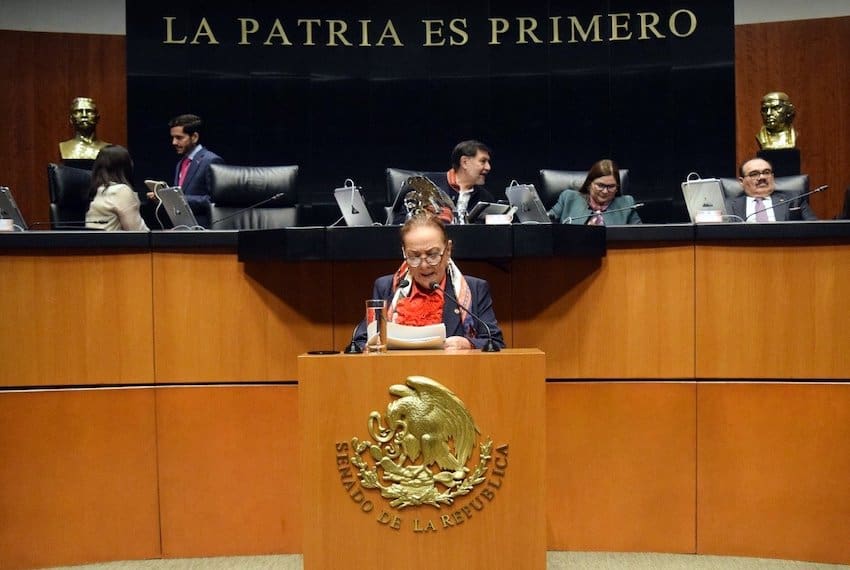The Mexican Senate on Tuesday approved legislation dubbed the “Spy Law,” which will give the federal government broad intelligence and surveillance powers.
The National Investigation and Intelligence System Law was supported by the ruling Morena party and its allies, ensuring its passage through the Chamber of Deputies last week and the Senate on Tuesday night.
Sixty-seven senators voted in favor of the legislation, 29 opposed it and there were three abstentions.
The law, which will take effect once promulgated by President Claudia Sheinbaum, will give the federal Security Ministry broad powers to access people’s personal and biometric data as well as their financial information, among other sensitive data. Security authorities will be able to access telecom metadata, allowing them to track people’s location.
They will be able to access people’s data, reportedly without obtaining a judicial warrant, and will have the capacity to seek information from public and private sources. Private companies that refuse to hand over data that authorities want face legal sanctions and other potential consequences.
Data collected will be used to create “intelligence products for the prevention, investigation and prosecution of crimes,” according to the law. Artificial intelligence tools and other digital systems and programs can be used to assist the creation and use of “public security strategies, actions and intelligence products that … strengthen operations” carried out by security forces.
The “intelligence products” will also help to “identify and combat threats to and impacts on public security,” according to the law.
The law also allows for the creation of a new intelligence division within the federal Security Ministry.

Senator Ricardo Anaya, the leader of the National Action Party (PAN) in the upper house and a former presidential candidate, was among the opposition senators who voted against the law.
“Big Brother is watching you,” he wrote on social media on Tuesday before the vote on the National Investigation and Intelligence System Law took place.
“This extraordinary period [of Senate sessions] will go down in history as the darkest. Morena consolidated the #SpyGovernment: geolocation, access to your health, bank and biometric data without [approval from a] judge. We will not be accomplices. We will vote no!” Anaya wrote.
The federal government, including Morena lawmakers, argue that the National Investigation and Intelligence System Law, and other security-related legislation, is required to bolster the state’s capacity to combat organized crime, which has a pernicious effect on Mexican society all over the country.
Central Intelligence Platform to be created
The National Investigation and Intelligence System Law allows for the creation of a Central Intelligence Platform, where data collected by security authorities will be stored. The platform must be ready for use within 180 days of the promulgation of the law.
The platform, which will be under the control of the National Intelligence Center, will “interconnect databases of all of the country’s public security and law enforcement institutions,” Morena party senators said in a statement.
Security officials, including National Guard personnel, will be able to access the information on the platform as part of their efforts to prevent and investigate crimes.
The investigation and intelligence law establishes a range of standards that all officials who manage intelligence information must meet.

Writing in his publication The Mexico Political Economist, Mexico City-based journalist Alex González Ormerod asserted that “the government of Claudia Sheinbaum is building the apparatus of a police state in Mexico.”
“The dominance of organized crime in Mexico is the main reason that the surveillance apparatus is being bolstered. It’s not a surprise, given Sheinbaum’s clear desire to focus on intelligence rather than direct military confrontation,” he wrote.
“Additionally, pressure from the U.S. — cancelling prominent Mexicans’ visas and advocating for military intervention if Mexico can’t sort out cartels — has lit a fire under the government, explaining the rush to get these surveillance measures through,” González Ormerod wrote.
‘Extremely important’ legislation or ‘espionage disguised as public policy’?
During debate in the Senate chamber on Tuesday, Morena Senator Laura Estrada Mauro asserted that the legislation is “extremely important,” arguing that it is required to combat crime in Mexico, much of which is perpetrated by organized crime groups including drug cartels, six of which have been designated as foreign terrorist organizations by the United States government.
She asserted that the new investigation and intelligence law will not allow unjustified invasions of people’s privacy, as decisions to obtain access to personal data must be approved by the Federal Attorney General’s Office — which is ostensibly independent of the federal government — and will be subject to judicial controls.
Senator María del Rosario Corona Nakamura of the Ecological Green Party of Mexico (PVEM), an ally of Morena, said that the law will provide authorities with the technological tools they need to prevent and prosecute crimes.
For his part, PAN Senator Francisco Ramírez Acuña described the law as “espionage disguised as public policy.”
He criticized what he called the capacity of authorities to have “disproportionate” access to sensitive information, and asserted that the law doesn’t establish clear rules or controls governing authorities’ ability to access personal data.
Morena Senator Félix Salgado Macedonio questioned opposition senators’ motivation for opposing the law, suggesting that they are worried about their bank accounts in tax havens being detected.
The National Investigation and Intelligence System Law has also faced significant criticism outside of Congress.
The Network in Defense of Digital Rights (R3D), a non-governmental organization, said on social media on Tuesday that the Senate had granted “permission to spy” with its approval of the law.
“Legalizing surveillance and access to our [personal] information without controls, judicial orders or any safeguard, through public and private databases, is an abuse of human rights,” the organization said.
🚨 “No hay un límite para el acceso de las autoridades a los datos”, me comentó Francia Pietrasanta, abogada en tecnología y datos en @R3Dmx.
👉 “El gran problema es lo que está en la leyes de investigación y de seguridad, que implementa la fusión de bases de datos (…) Podría… pic.twitter.com/DuG7p8Zzlo
— Azucena Uresti (@azucenau) July 2, 2025
In a radio interview on Wednesday, R3D lawyer and project leader Francia Pietrasanta said that “there is no limit” on authorities’ capacity to access people’s data.
“The authorities can access your movements in real time and very sensitive data could be revealed,” she said.
Pietrasanta said that the National Investigation and Intelligence System Law, and other security laws recently approved by Congress, “create massive infrastructure in order to be able to surveil all people.”
Luis Fernando García, a lawyer and former director of R3D, warned that the legislation could institutionalize espionage. He highlighted that the National Guard, the army and other security institutions will have real-time access to a range of personal data.
Senate also approves General National Public Security System Law
On Tuesday night, the Senate also approved the General National Public Security System Law, which, according to Morena senators, “establishes the operation of joint strategies between all public security institutions.”
Most senators with the PAN voted in favor of the law, as did Citizens’ Movement party senators, and those representing Morena and its allies, the PVEM and the Labor Party. Institutional Revolutionary Party (PRI) senators voted against it.
The law, which was also approved by the Chamber of Deputies last week, creates a new regulatory framework to coordinate security collaboration between federal, state and municipal authorities.
Increased coordination between security authorities at different levels of government is one of the four “ejes” — axes or core tenets — of the federal government’s national security strategy. Strengthening investigation and intelligence practices is another.
Morena senators said that the General National Public Security System Law will “optimize the functioning” of security policy by “establishing absolute coordination between the [federal] Security Cabinet and the federal entities,” or states.
The law creates “a model of total coordination for public security” between all levels of government, they said.
The General National Public Security System Law also creates a National Information System, of which various databases and registries — including ones with information on arrests, prisoners and court orders aimed at protecting women and children — will be part.
Morena Senator Lucía Trasviña, president of the upper house’s public security committee, declared that the law, and the National Investigation and Intelligence System Law, will right public security wrongs of the past.
“For decades, Mexico suffered the consequences of a [security] strategy focused on the excessive use of force and … [with] fragmented coordination structures,” she said.
“Today we’re consolidating a new model focused on intelligence, professionalization and cooperation,” Trasviña said.

“… It’s not about spying,” she said. “It’s about acting with institutional responsibility, legality and guarantees. [We’re] talking abut surveillance for security, not arbitrary surveillance,” Trasviña said.
Senator Anaya said that the General National Public Security System Law represented “recognition that the ‘hugs, not bullets’ strategy,” implemented by the administration of former president Andrés Manuel López Obrador, “was an absolute failure,” and for that reason, the PAN supported it.
However, the National Investigation and Intelligence System Law is the “final nail in the coffin” for privacy in Mexico and the installation of a “spy government,” he said.
The government “will be able to monitor your cell phone [to find out] what time you go out, who you meet up with,” Anaya said.
PRI Senator Miguel Ángel Riquelme, a former governor of Coahuila, said that both laws approved on Tuesday are part of a “legal framework that seeks to restrict freedoms and weaken our democracy.”
“They’re taking away rights … to establish a police-military state,” he said.
PAN Senator Marko Cortés was equally scathing in his assessment of the laws.
“They’re empowering the operational arms of the presidency without any control or limit. They’re militarizing security and the violation of human rights is clearly going to increase,” he said.
“We can’t accept that the government has unlimited, uncontrolled access to [people’s] private lives. They can already do that, but with judicial orders. It’s unacceptable that it will be permanent, discretional and without a judicial order. … They will have all our information,” Cortés said.
In addition to the two laws approved by the Senate on Tuesday, Morena has approved, or is seeking to approve, a range of other laws that government critics say violate people’s right to privacy and, in the case of a new National Guard Law, increase the militarization of public security in Mexico.
With reports from Infobae, Milenio, Aristegui Noticias, Quadratín and Reforma
